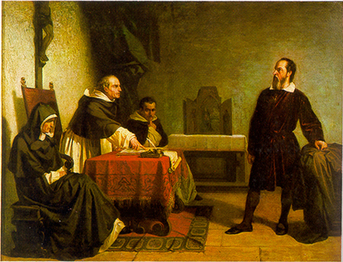In response to attacks on the teaching of evolution in public schools, Michael Zimmerman, then a biology professor at Butler University, initiated the Clergy Letter Project in 2004. By enlisting nearly 200 clergy members of different faiths to sign a letter, he helped persuade the school board of Grantsburg, Wisconsin, to drop opposition to teaching evolution. |
It is delicious because Sinai is the quintessential moment of revelation in Jewish tradition—a moment in which knowledge comes directly from God to humanity. It is the very idea of revelation that is at the heart of the debate over evolution. What happens when theories developed by the scientific method appear to contradict the revealed word of sacred scriptures? Are devout believers obliged to refute such theories? Do scientific theories and revealed religious truths have equal standing in our society?
You can easily find people who stand on either extreme of these questions. There are secularists who say that only the testable and provable theories of science deserve to be called "truths." There are religious fundamentalists who will say that God's word is the only reliable source of truth and any deviation from that truth constitutes a false religion. For religious liberals (like me), understanding the relationship between science and divine revelation is a bit more complicated.
I begin by admitting that there are many different kinds of truth. There is no way to test statements like "murder is evil," "the stars are beautiful," or "I love my wife," in the same way that we can test the sum of two plus two. Yet, a person can be more certain of those truths in their heart and mind than anything that can be analyzed rationally. There are things that we know to be true without the need of proof.
Religion runs into difficulty, though, when it tries to read the non-rational, ethical, aesthetic and divine truths of scripture as if they were the same type of truths as those sought by science. If so-called "biblical literalists" insist that the first chapter of Genesis is a description of the world's physical origins, they eventually will earn and deserve the same reputation as those who condemned Galileo for placing the sun at the center of the solar system.
Science and religion, ultimately, are trying to answer different questions. Science seeks to describe the universe, what it is, how it works, and how it may change in the future. Religion has a different goal. Religion seeks to discover the meaning and purpose of reality—why we are here, how we are meant to live our lives, and how we understand ourselves. Looking for clues to the physical origin of species in the Bible makes about as much sense as looking for love in a test tube.
Most Jewish thinkers through the ages have been able to resolve perceived conflicts between revealed truths and scientific truths. Rambam (Maimonides), the great 12th century Jewish philosopher and legalist, wrote that since God gave humanity reason, it is our obligation to use our abilities to discover scientific truths about the natural world. Rambam went further to say that if truths proven by science appear to contradict Torah, we have an obligation to try to understand these natural truths more deeply, or to adjust our interpretation of Torah to allow for them.
Judaism offers no obligation to refute the evidence of our senses or the reasoning ability of our minds. Reason and revelation can coexist.
What does this say about the way we think about revelation and Sinai? The Torah that was revealed at Sinai is not a history textbook or a compendium of scientific knowledge. It is a way of viewing the world. It does not offer facts, it give us something greater. The revelation of Sinai is that we live in a universe that has a purpose and a moral order. By engaging with words of Torah, we discover how to live lives that matter and lives that can discover the joy of being true to ourselves and our yearning to know God.
Other Posts on This Topic:
The Problem with Certainty
Shavuot: The Torah is Your Lover


 RSS Feed
RSS Feed
